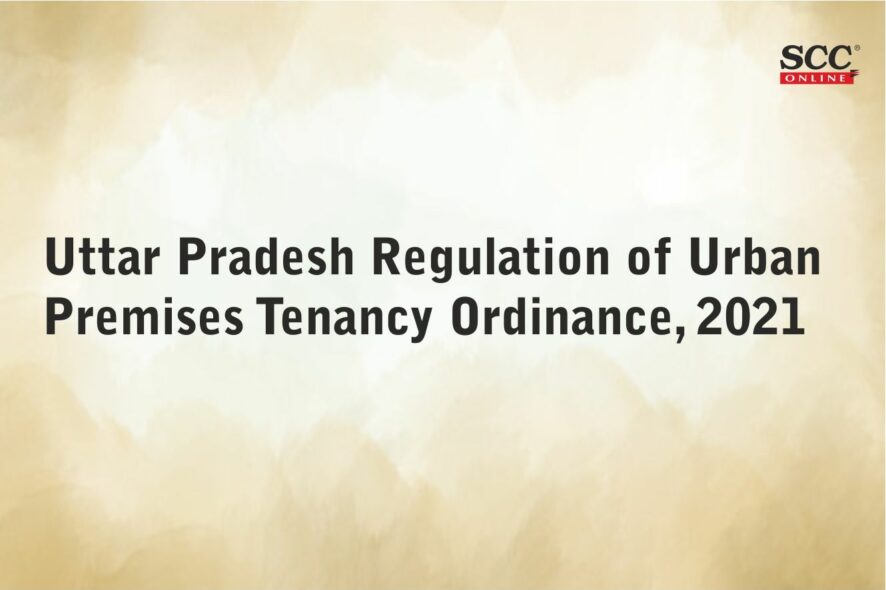Governor of Uttar Pradesh promulgates the Uttar Pradesh Regulation of Urban Premises Tenancy Ordinance, 2021
Purpose of the Ordinance: To establish Rent Authority and Rent Tribunals to regulate renting of premises and to protect the interests of landlords and tenants and to provide speedy adjudication mechanism for resolution of disputes and matter connected therewith or incidental thereto.
[Section 3] Ordinance not to apply to certain premises:
- Premises owned by the Central or State Government or Union Territory Administration or a Government undertaking or Enterprises or Statutory Body or Cantonment Board.
- Premises owned by a Company, University or Organisation given on rent to its employees as part of service contract
- Premises owned by religious or charitable institution as may be specified, by State Government’s notification.
- Premise owned by Auqaf registered under the Waqf Act, 1995 or by any public trust registered under applicable law.
- Other building or category of buildings specifically exempted in public interest by notification by the State Government.
[Section 4] Tenancy Agreement
No person shall, after the commencement of this Ordinance, let or take on rent any premises except by an agreement in writing, which shall be informed to the Rent Authority by the landlord and tenant jointly.
In case the tenant and landlord fail to jointly inform the execution of the tenancy agreement, the both of them shall separately inform the execution of tenancy agreement to the Rent Authority within a period of 1 month from the date of expiry.
[Section 5] Period of Tenancy
Every tenancy entered into after the commencement of this Ordinance shall be valid for a period as agreed upon between the landlord and the tenant.
Tenant may request the landlord for renewal or extension of the tenancy, within the period agreed to in tenancy agreement, and if agreeable to the landlord, may enter into a new tenancy agreement with the landlord or mutually agreed terms and conditions.
If a tenancy for a fixed term ends and has not been renewed or the tenant fails to vacate the premises at the end of such tenancy, then such tenant shall be liable to pay an enhanced rent to the landlord.
[Section 6] Rights and Obligations of successor in case of death
Terms of agreement shall be binding upon their successors in the event of the death of the landlord or tenant, the successor of the deceased landlord or tenant shall have the same rights and obligations as agreed to in the tenancy agreement for the remaining period of such tenancy.
In the event of the death of tenant, the right of tenancy shall devolve on his successors, namely:
Spouse, son or daughter or where there are both son and daughter, both of them; parents; daughter-in-law, being the widow of his pre-deceased son; widowed or divorced sister
[Section 7] Restriction on sub-letting
No tenant shall, except by entering into a supplementary agreement to the existing tenancy agreement:
- Sub-let whole or part of the premises held by him as a tenant
- Transfer or assign his rights in the tenancy agreement or any part thereof
[Section 10] Rent Authority to determine the revised rent in case of dispute
In determining the rent to be revised, the rent authority may be guided by the prevailing market rent in the surrounding areas let out on rent.
[Section 11] Security Deposit
Security deposit to be paid by the tenant in advance shall be such as may be agreed upon between the landlord and the tenant in the tenancy agreement, which shall be:
- Not exceed two months’ rent, in case of residential premises; and
- Not exceed 6 months’ rent, in case of non-residential premises.
Security Deposit shall be refunded to the tenant on the date of taking over vacant possession of the premises from the tenant, after making due deduction of any liability of the tenant.
[Section 14] Deposit of rent with Rent Authority
Where the landlord refuses to accept any rent and other charges payable or refuses to give a receipt, the rent and other charges shall be paid to the landlord by postal money order or any other method, in such manner as may be prescribed, consecutively for two months, and if the landlord refuses to accept the rent and other charges within such period, then the tenant may deposit the same with the Rent Authority.
In case the tenant is unable to decide as to whom the rent is payable during the period of tenancy agreement, the tenant may, in such case, deposit the rent with the rent authority.
[Section 15] Repair and Maintenance of Property
In case tenant fails or refuses to carry out the repairs, the landlord may carry out the repairs and deduct the amount incurred for such repairs from the security deposit and the amount so deducted shall be paid by the tenant within a period of one month of the issue of notice by the landlord.
To read more, click on the link below: Tenancy Ordinance








Will this be applied retrospectively so that old cases where there has been no agreement between landlord and tenant,and later is living for many years, will in this case also it will become mandatory to be in contract?